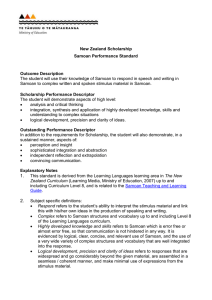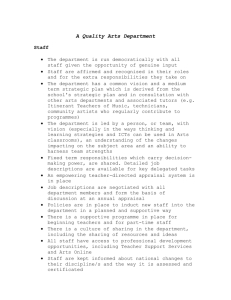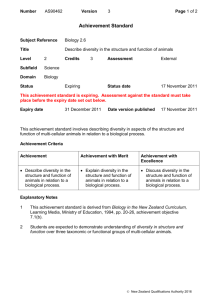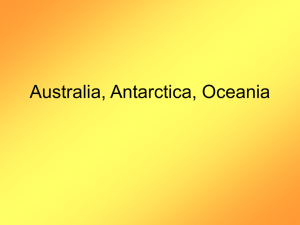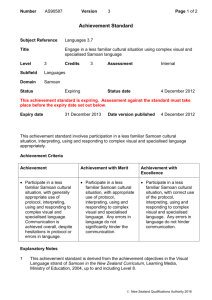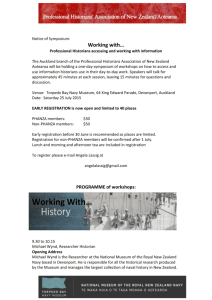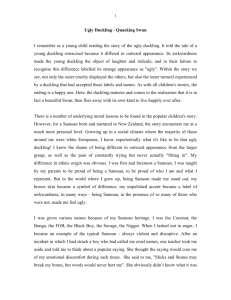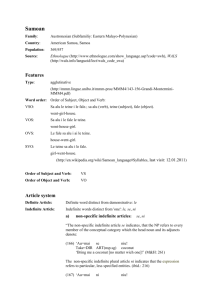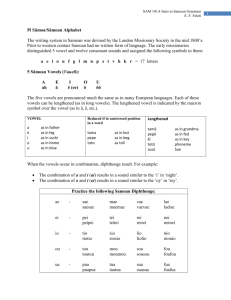Issue 1 | Terms 1 and 2 | March 2009
advertisement
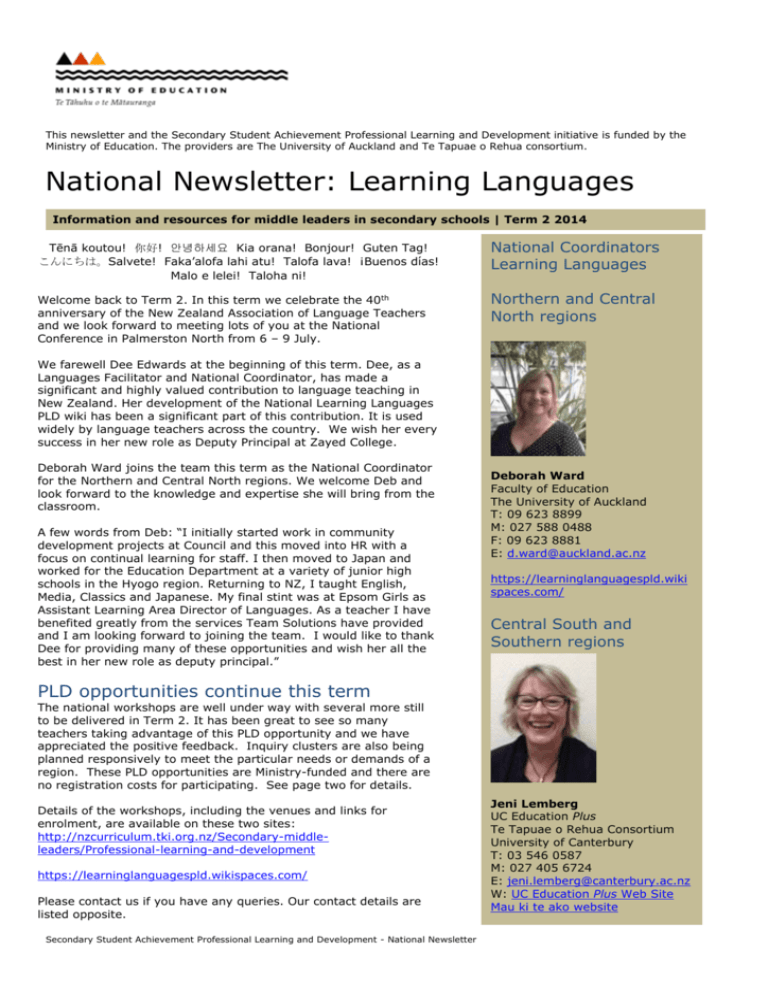
This newsletter and the Secondary Student Achievement Professional Learning and Development initiative is funded by the Ministry of Education. The providers are The University of Auckland and Te Tapuae o Rehua consortium. National Newsletter: Learning Languages Information and resources for middle leaders in secondary schools | Term 2 2014 Tēnā koutou! 你好! 안녕하세요 Kia orana! Bonjour! Guten Tag! こんにちは。Salvete! Faka’alofa lahi atu! Talofa lava! ¡Buenos días! Malo e lelei! Taloha ni! National Coordinators Learning Languages Welcome back to Term 2. In this term we celebrate the 40th anniversary of the New Zealand Association of Language Teachers and we look forward to meeting lots of you at the National Conference in Palmerston North from 6 – 9 July. Northern and Central North regions We farewell Dee Edwards at the beginning of this term. Dee, as a Languages Facilitator and National Coordinator, has made a significant and highly valued contribution to language teaching in New Zealand. Her development of the National Learning Languages PLD wiki has been a significant part of this contribution. It is used widely by language teachers across the country. We wish her every success in her new role as Deputy Principal at Zayed College. Deborah Ward joins the team this term as the National Coordinator for the Northern and Central North regions. We welcome Deb and look forward to the knowledge and expertise she will bring from the classroom. A few words from Deb: “I initially started work in community development projects at Council and this moved into HR with a focus on continual learning for staff. I then moved to Japan and worked for the Education Department at a variety of junior high schools in the Hyogo region. Returning to NZ, I taught English, Media, Classics and Japanese. My final stint was at Epsom Girls as Assistant Learning Area Director of Languages. As a teacher I have benefited greatly from the services Team Solutions have provided and I am looking forward to joining the team. I would like to thank Dee for providing many of these opportunities and wish her all the best in her new role as deputy principal.” Deborah Ward Faculty of Education The University of Auckland T: 09 623 8899 M: 027 588 0488 F: 09 623 8881 E: d.ward@auckland.ac.nz https://learninglanguagespld.wiki spaces.com/ Central South and Southern regions PLD opportunities continue this term The national workshops are well under way with several more still to be delivered in Term 2. It has been great to see so many teachers taking advantage of this PLD opportunity and we have appreciated the positive feedback. Inquiry clusters are also being planned responsively to meet the particular needs or demands of a region. These PLD opportunities are Ministry-funded and there are no registration costs for participating. See page two for details. We look forward to Details of the workshops, including the venues and links for enrolment, are available on these two sites: http://nzcurriculum.tki.org.nz/Secondary-middleleaders/Professional-learning-and-development https://learninglanguagespld.wikispaces.com/ Please contact us if you have any queries. Our contact details are listed opposite. Secondary Student Achievement Professional Learning and Development - National Newsletter Jeni Lemberg UC Education Plus Te Tapuae o Rehua Consortium University of Canterbury T: 03 546 0587 M: 027 405 6724 E: jeni.lemberg@canterbury.ac.nz W: UC Education Plus Web Site Mau ki te ako website Youth Guarantee – regional workshops The Ministry of Education’s Youth Guarantee (YG) team is holding a series of regional workshops over the coming months. These workshops will provide professional support, and sharing of practice for YG initiatives such as Achievement 2013-17. They are aimed at Csupporting schools to improve NCEA Level 2 achievement for targeted groups of students. They will also demonstrate how all education providers – secondary and tertiary - can use the Vocational Pathways in their curriculum planning, programme development, contextualised learning and to develop learning and career pathways. The workshops will be interactive and will focus on providing examples of good practice and professional learning to enable education professionals and their respective organisations to increase retention, improve achievement and enable successful transitions to further study, training and employment. Please view the schedule here: http://youthguarantee.net.nz/home-/workshop-calendar/. Some registration links are not yet available, so please check again shortly to register. Updates to assessment specifications 2014 The following assessment specifications have been updated, mostly as a result of finalisation of the standards review process. Teachers should not need to alter their teaching programmes as a result of these updates. To check assessment specifications go to the NCEA Subject Resources page, next to the particular language, and then to Assessment Specifications, under the heading: Resources for externally assessed standards. NCEA Cook Islands Māori Level 1, Level 2, Level 3 (all standards) Korean Level 1, Level 2, Level 3 (all standards) Lea Faka-Tonga Level 1, Level 2 (all standards) Te Reo Māori Level 2 (91286, 91287) Te Reo Rangitira Level 1 (all standards) New Zealand Scholarship Languages (Chinese, French, German, Japanese, Samoan, Spanish) New Zealand Scholarship languages (Chinese, French, German, Japanese, Samoan, Spanish) assessment specifications have been updated with ‘or Te Reo Māori’ added to Question Two. Social media guidelines for teachers With the increasing use of social media in language learning programmes, it is timely to remind teachers of the risks that social media poses for teachers. www.teachersandsocialmedia.co.nz has been extensively publicised by the Teachers’ Council. The guidelines don’t say ‘don’t use social media’ but the main message is that teachers need to think very carefully about what they put online, the potential consequences, and the value of the communication, before using social media channels with students, parents and whānau. Many teachers have read and understood the material provided and teacher education providers are using the website material in their courses with student teachers. National workshops 2014 Developing Coherent Learning Languages Programmes in Years 9 -13 The overarching theme for the day will be developing coherency in Learning Languages programmes across Years 9 to 13. Course participants will have the opportunity to inquire into the best practice of curriculum design across Levels 1-8 of the NZC to promote successful achievement in NCEA. Differentiation and task-based language teaching in BYOD environments will be included in the focus areas of this workshop. Northern and Central North regions The national workshops in the Northern and Central North regions were well publicized and were held in term 1. Central South and Southern regions Workshops have already been held in Taranaki, Nelson, Wellington and South Canterbury in term 1. Christchurch: Thurs 22 May and Thurs 29 May (closed to new enrolments) UC College of Education Invercargill: Wed 18 June UOCE Southland Campus Dunedin: Fri 20 June UOCE Otago Campus Manawatu: Wed 04 June Fielding High School, 1 Churcher Street, Fielding So have a look at the site and make sure you’re doing as much as you can to avoid any of the many pitfalls that an otherwise valuable and effective form of communication can present. Teachers who are new to using social media in their Learning Languages teaching and learning programmes, or who are looking for further guidance on this topic, will find this resource useful http://learninglanguagespld.wikispaces.com/file/detail/social+media+a nd+creativity Secondary Student Achievement Professional Learning and Development - National Newsletter 2 Online submission of moderation materials Schools are able to submit materials for standards selected for moderation through an online submission process as an alternative to the current courier bag system. Regional Facilitator Learning Languages This can be done through My Portfolio, Google Drive, Dropbox and other processes or systems that allow teachers to gather the required assessment materials, along with student evidence, and submit these for moderation via a single link (secret URL). If any department would like to make an online submission of moderation materials, the Principal’s Nominee should submit links to modsub@nzqa.govt.nz, when the school’s moderation is due, clearly indicating the subjects and standards. Moderation reports will be available from the ‘Moderation Results’ link through the school’s general access login. Submission of materials as attachments to email cannot be accepted. If you have any enquiries talk to your Principal’s Nominee. New Zealand Association of Language Teachers (NZALT) Siliva Gaugatao Faculty of Education The University of Auckland T: 09 623 8899 ext. 48134 M: 027 555 4655 F: 09 623 8881 E: s.gaugatao@auckland.ac.nz W: http://www.teamsolutions.ac.nz Language Weeks Online registration for the NZALT International Biennial Conference 2014 in Palmerston North is now open http://www.eenz.com/nzalt14/. Presentations are now being called for with guidelines available on http://www.eenz.com/nzalt14/. The deadline for submissions has been extended. Members of NZALT receive generous discounts when registering and should note that subscriptions for 2014 are now due. Differentiation in a Learning Languages classroom The New Zealand Curriculum has a vision of confident, connected, actively involved and lifelong learners and in our Learning Languages programmes, we need to ensure that this is fulfilled. What would this look like in a Learning Languages classroom? Susan Reese summarizes a number of different perspectives from various language teachers in her article, “How do you support Every Learner? Differentiation in the Language Classroom”. There are some excellent ideas for all languages, from tiered lessons, to learning stations with the use of such strategies as choice boards, RAFT assignments, flexible grouping and cooperative learning. The article builds further for language teachers on the work of Carol Ann Tomlinson, an expert on differentiated instruction. Tomlinson comments that effective teachers link three areas of curriculum in a differentiated classroom: content (what students will learn), process (the activities through which they will learn, product (how they demonstrate and extend what they understand and can do). It is important to remember that “only one portion of a lesson (content, process, or product, or the learning environment) is differentiated, not all of them,” as explained by Deborah Blaz. This is vital to remember, as it is finding the time which sometimes provides teachers with the greatest challenge in differentiating the learning in their classrooms. The advice to start small, possibly just at the product stage is a very valid one. Despite the possible increase in workload which creating differentiated instruction may cause, once implemented, it can save time and it can enrich our language classrooms by making the learning more meaningful. To read the article that has been reviewed here, go to the Learning Languages wiki. Secondary Student Achievement Professional Learning and Development - National Newsletter New Zealand Sign Language Week May 12 – 18 Te Wiki o te Reo Māori July 21-27 http://www.nzhistory.net.nz/media/ photo/maori-language-petition1972 http://www.teara.govt.nz/en/urban -maori/3/4 International Languages Week 17-23 August http://www.nzalt.org.nz/events/ilw. shtml Pasifika Language Weeks Gagana Samoa Language Week May 25 - 31 Cook Islands Māori Language Week August 04 - 10 Lea Faka-Tonga Language Week September 01 - 07 Tuvalu Language Week Sep 29 - Oct 05 Fiji Language Week October 06 - 12 Vagahau Niue Language Week October 13 - 19 Gagana Tokelau Language Week Oct 26 - Nov 01 3 Top scholar aspires to help the community and the world Salome Sabrina Wright was the top scholar for Samoan language in the 2013 Scholarship exam. The Mangere College student arrived in New Zealand in 2012 from Samoa, with a clear focus of enhancing her educational achievement. She has attributed her success to hard work, regular practice in language interactions and writing tasks, thinking “outside of the box,” and the expert guidance of her teachers Mrs Ah Sam and Mr Fesulua’i. Salome is from the villages of Luatuanuu, Gataivai and Leauvaa. Here are some tips from Salome about language learning and preparation for the Scholarship examination. How did you prepare for the Scholarship examination? Investment in the preparation for the Polyfest impromptu speech competition earlier in the year helped me to quickly think on my feet. In the spoken presentation, I had to think about the appropriate language to use, organise my thoughts, and to ensure there was sufficient detail to support my ideas. I read a wide range of texts in Samoan - newspapers, online articles, magazines and books to see how other people used the language to convey their messages. I also practised translating from English to Samoan, and vice versa, to check my deeper understanding of both languages. What advice would you give to candidates to help them prepare for Scholarship examination this year? Give everything hundred percent! Do not leave the exam room thinking about the “what ifs,” or “should haves.” I work hard on preparing myself mentally and physically about coping with the unexpected and how to best get my ideas across. It is important to push yourself to think outside of your comfort zone, so that you can come to an issue from different perspectives. I also stress the importance for students to be clear about the language and cultural requirements for the tasks at scholarship level. How did you maintain the focus on learning the Samoan language and culture at Year 13? I was surrounded by an environment where the Samoan language was constantly used - my church, family, friends and school. My friends at school all supported each other, by using Samoan as much as possible every day. As most of us used English as the main language to communicate, it was important to make an effort to speak as much Samoan in class, and in the playground. In class, we were challenged to think, write, and to respond to a range of audiences where our depth of language and culture was “checked.” What career pathway are you pursuing at the moment? I am now in my first year at the University of Auckland doing a conjoint BA/LLB – majoring in Pacific Studies. Although I find the university environment challenging, I am sure about one thing – I want to help the community lift the achievement of Pasifika people in NZ especially in education. I have aspirations of becoming a teacher, or working for the United Nations, offering aid to the needy. Language associations NZ Association of Language Teachers http://www.nzalt.org.nz/ NZ Chinese Language Teachers Association http://groups.yahoo.com/neo/group s/nzclta/info NZAJLT NZ Association of Japanese Language Teachers Jo Barber, President Email: jo.barber.nz@gmail.com http://www.japanese.ac.nz/ STANZA The Spanish Teachers' Association of New Zealand Aotearoa Cheryl van Dijk, President Email: cheryl.VanDijck@stcuthberts.school. nz http://web.me.com/stanza/STANZA /Welcome.html GANZ German in Aotearoa New Zealand Antonie Alm, President Email: antonie.alm@otago.ac.nz http://ganz.ac.nz/ NZAFT New Zealand Association of French Teachers Sue Pommarède, President E-mail: suepnzaft@gmail.com http://www.french.ac.nz/ Tongan Language Teachers Association Brian Lata, Secretary BrianL@tangaroa.school.nz FAGASA, National Association of Samoan Language Teachers in NZ Galumalemana Alfred Hunkin, Chairperson galumalemana.hunkin@vuw.ac.nz Secondary Student Achievement Professional Learning and Development - National Newsletter 4
